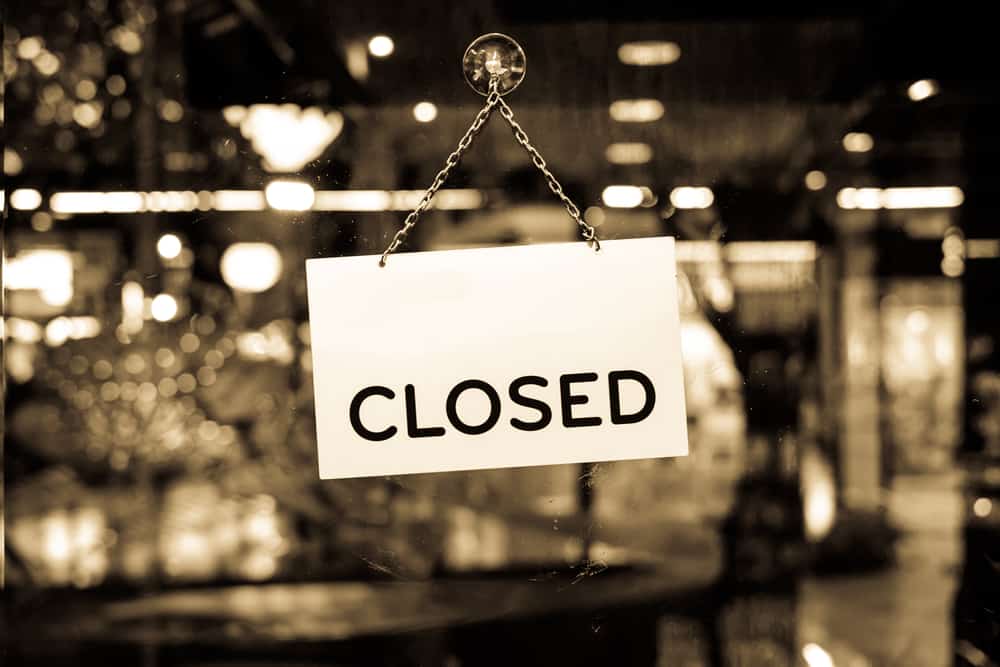
Picking the best forex broker is perhaps the critical step on your forex trading journey, and you will no doubt put a lot of time and effort into choosing a broker that meets all your needs as a trader. Sometimes, however, brokers fail and go out of business, and there is often no way you could have predicted such a thing would happen. So, what happens if your Forex broker goes bankrupt? How do you, as a trader, proceed? And will you get your money back? Today we’ll look at those questions and cover what might happen to you and your deposit funds if your broker goes out of business.
What Happens if a Forex Broker Goes Bankrupt?
Reliable brokers should always keep client funds separate from the operating funds of the business. Therefore, if the business goes bankrupt, only its funds can be used to recover debts and outstanding charges for which the company itself is responsible. Client funds should, in theory, always be protected. To manage this, brokers use nominee companies to keep their customers’ assets separate from those belonging to the broker. Client funds are effectively “ring-fenced” and kept in a separate account.
As you read through broker websites, you will often see the claim that they segregate client funds in top-tier bank accounts. It may not always have been clear to you exactly what that meant, but if your broker goes bust, you will soon become aware of how important it is.
Suppose your broker has not effectively segregated client funds from its own money and goes into administration. In that case, clients’ assets could be part of the funds assessed and used to pay back the broker’s creditors (that is, the entities the broker currently owes money to that are entitled to claim on the firm’s assets to recover their debts).
While segregated funds should theoretically protect all clients and mean that your money will be returned to you, that is not always the case when a broker enters bankruptcy. For example, if the broker is guilty of fraud, it could take many forms. It might include that the broker may have channelled client funds that should have been in segregated accounts back into its operating funds and either used them to (mis)manage the company or even steal them.
If the firm is regulated, the regulating body should have regularly checked that nothing like this was happening. Still, regulators do not monitor every firm 24/7, and it is certainly possible for this type of fraud to occur.
It is also possible that the firm has simply been poorly managed. That could include poor record-keeping processes, which could leave the firm with no idea which clients own which assets. While client funds are kept in separate accounts from the broker’s funds, the funds are sometimes pooled together, so inaccurate record-keeping can have serious consequences.
Long-term, consistently poor record-keeping could mean the broker cannot determine which assets are held on behalf of which client. There may even be a discrepancy between what should officially be in the segregated accounts and what’s actually there. While this can be a sign of fraud, it can also be due to badly managed funds and inaccurate record-keeping.
How is my Money Protected?
In many jurisdictions, customer funds held with brokers and other financial institutions are protected in the case that a forex broker goes bankrupt. It will depend on the country the broker operates in, the rules set out by its regulator and the country’s national laws.

In the UK, for example, the Financial Services Compensation Scheme (FSCS) is in place to protect the clients of all brokers regulated by the UK’s Financial Conduct Authority (FCA), which in theory, should be every broker and financial institution registered in the country.
The FSCS is not just a body that tries to ensure your funds are recovered. They are your insurance if your funds are, in fact, not recoverable. If your forex broker, or any financial firm you’ve used, has gone out of business and does not have the funds to pay your claim, the FSCS can step in to pay compensation.
While the government set up the organisation to protect citizens, it is technically an independent body, and to use the services it offers are free of charge. There are restrictions on how much each client can claim from a firm that has gone bust. It currently stands at £85,000 per individual account and £170,000 for a joint account.
Many other jurisdictions have some rules that should protect the clients of firms that go into liquidation, but this varies significantly from country to country. In the USA, for example, the Net Capital Rule requires that firms must:
“At all times have and maintain net capital at specific levels to protect customers and creditors from monetary losses that can occur when firms fail.”
Such firms must notify FINRA if their net capital falls below the minimum amount required by the Net Capital Rule. Again, this offers some protection; however, like any law or regulation, it will be disregarded if the broker deliberately commits fraud. Unfortunately, the regulator may find out too late that this is the case.
How Can I Check That My Broker is Safe?
Trading with a regulated broker, who is fully licensed to operate in the country where you live and trade, offers a layer of protection that traders cannot afford to ignore. Regulation and licensing do not fully protect you from the possibility a broker can fail. Still, they may make the event less likely while protecting you from the losses that could be incurred if it does happen. Any broker can state on its website that it is regulated, so always double-check with the regulator’s site to see if it lists the broker.
You should look for safety features when researching brokers, including keeping all client funds segregated in top-tier accounts and having adequate deposit protection in place to pay out compensation to traders, should it become necessary. It is also worth looking at the site’s security protocols and data encryption, as this can prevent hacking and, therefore, potentially fraudulent activity by outside entities.
Watch out for broker ‘red flags’ such as those that promise unrealistic or guaranteed results from forex trading or that pressure you to invest more money than you can afford or to invest quickly due to a ‘time-sensitive opportunity’. Also, be wary if withdrawing your money is difficult or costly. There are plenty of safe brokers out there, but unfortunately, there is also always the risk of being taken in by clever scam brokers.
Related Articles
What About Cryptocurrency Exchanges?
When it comes to cryptocurrency exchanges, things are somewhat different. Crypto exchanges have never been regulated like other financial institutions dealing with investments using fiat currency. Unlike fiat currency, cryptocurrency is not issued by a central bank or backed by national governments and is not considered legal tender in most countries.

Therefore, the crypto industry has long operated in a deregulated system, outside of the law, while not actually being illegal (at least not in most countries). However, that is changing. Following the collapse of the FTX crypto exchange, which left many investors with heavy losses, governments are reassessing their attitude to crypto investments. The UK government is now looking at tightening rules around crypto exchanges and brokers, and Canada has already taken steps to introduce more rules around crypto trading. We can expect that regulations will continue to be tightened up.
Safe Forex Brokers
Protect yourself as much as possible by only trading with safe, reliable forex brokers that are fully licensed and regulated. Check out our table of recommended brokers.
| Broker | Features | Min Deposit | EURUSD Spread | ||
|---|---|---|---|---|---|
 Your capital is at risk
US Clients: No Regulated : Yes Your capital is at risk
US Clients: No Regulated : Yes
|
– Regulated by FSCA, IFSC and FSC |
$200 | ECN 0.1, Standard 1.6 | ||
 Your capital is at risk
US Clients: No Regulated : Yes Your capital is at risk
US Clients: No Regulated : Yes
|
– Flexible leverage up to 500:1 |
$200 | From 0.1 | ||
 Your capital is at risk
US Clients: No Regulated : Yes Your capital is at risk
US Clients: No Regulated : Yes
|
– 40% New Member Bonus
|
$100 | Fixed |
Sign
Up
Europe* CFDs are complex instruments and come with a high risk of losing money rapidly due to leverage. 79% of retail investor accounts lose money when trading CFDs with this provider. You should consider whether you understand how CFDs work and whether you can afford to take the high risk of losing your money.
|
|
 * 82% of retail investor accounts lose money when trading CFDs with this provider. You should consider whether you can afford to take the high risk of losing your money
US Clients: No Regulated : Yes * 82% of retail investor accounts lose money when trading CFDs with this provider. You should consider whether you can afford to take the high risk of losing your money
US Clients: No Regulated : Yes
|
|
100GBP/AUD/EUR/USD | variable |
Sign
Up
* 82% of retail investor accounts lose money when trading CFDs with this provider. You should consider whether you can afford to take the high risk of losing your money
|
|
 Between 74-89 % of retail investor accounts lose money when trading CFDs
US Clients: No Regulated : Yes Between 74-89 % of retail investor accounts lose money when trading CFDs
US Clients: No Regulated : Yes
|
|
$200 | NDD 0.09 / Standard 0.69 |
Sign
Up
Between 74-89 % of retail investor accounts lose money when trading CFDs
|
|
 76% of CFD traders lose money
US Clients: No Regulated : Yes 76% of CFD traders lose money
US Clients: No Regulated : Yes
|
|
$50 (varying by Country) | from 1 |
Sign
Up
76% of retail investor accounts lose money when trading CFDs with this provider. You should consider whether you understand how CFDs work, and whether you can afford to take the high risk of losing your money.
|
|
 Your capital is at risk
US Clients: No Regulated : Yes Your capital is at risk
US Clients: No Regulated : Yes
|
|
$5 | From 0.0 pips | ||
 Your capital is at risk
US Clients: No Regulated : Yes Your capital is at risk
US Clients: No Regulated : Yes
|
– CySEC, FCA, FSCA, SCB Regulated |
$100 | |||
|
|
|||||
Perhaps the most important thing to keep in mind is that the better the choice you make in picking a broker, the less likely you are to run into problems. Reputable, regulated brokers are less likely to run into financial trouble and become insolvent. However, if they do, they are more likely to have good protocols, security and record-keeping in place, along with some kind of insurance or compensation scheme. That will protect clients and enable them to recover the funds they had on deposit with the broker at the time of its collapse.
If your forex broker goes bankrupt, find out as soon as possible who is dealing with compensation or the return of client funds, and claim via the relevant channels. Don’t forget that if you are in the UK and were using an FCA-regulated broker, you can go directly to the FSCS and lodge a claim to immediately start the process of recovering your funds. If you are in another country, check with the national regulator to see if a similar option is available.